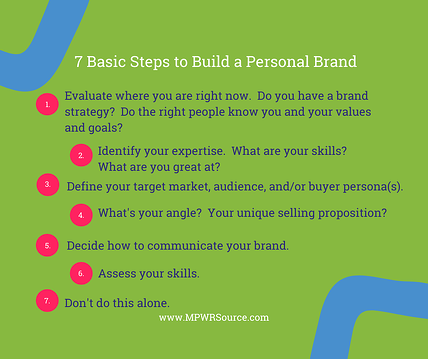Whether you are a solopreneur, a Hollywood celebrity, or a CEO of a Fortune 500 company, your personal brand describes where you are today and where you want to be in the future. Those with high visibility personal brands have serious brand equity. According to "What is Brand Equity?" in the Branding Journal, "brand equity represents the value of a brand. It is the simple difference between the value of branded product, and the value of that product without the brand name attached to it (Rosenbaum-Elliott, 2015)". Therefore, by increasing your personal brand, you increase the value of the branded product(s) or service(s) you offer. In other words, a personal branding strategy will help you take your reputation, business, and career from low value to high value.
Brand vs. Reputation
A brand is not the same thing as a reputation. Everyone has a reputation. First impressions, relationships with colleagues, clients, bosses, and peers, and how you communicate (verbally and nonverbally) impact how others see you. Your reputation is made up of the opinions and beliefs people form about you based on your actions and behaviors. For example, some people may say that you have a tendency to talk a lot but you are a phenomenal team player.
However, a brand is intentional. Your brand represents how you want people to see you. Your brand represents the values and purpose you outwardly represent. To create a personal brand you must be strategic by aligning your intentions (how you want people to see you) with your actions. By having an image that aligns with the opportunities you seek, you are more likely to secure those opportunities. For example, if your actions show that you care about helping small businesses and nonprofits grow and succeed, then you will be more likely to receive more opportunities to help small businesses and nonprofits grow and succeed.
In short, you have more control over your brand than your reputation. However, if your actions don't represent the brand you are trying to convey, your reputation will suffer. (Just take a look at any US Weekly magazine.)
Five Benefits of Building a Personal Brand
- As Andy Warhol said, "In the future, everyone will be world-famous for 15 minutes." You might get your 15 minutes of world fame, but you may become famous with those in your industry or your community, if that is your goal. The goal shouldn't be to be famous but to build a fan club of people who support you and share your values and goals.
- You get to be you! This means you get to be authentic, your real self. When you are your true self, you don't feel like you are "faking it until you make it", and you are more apt to do your best work.
- When you share your personal brand with the people who need to know you, you start attracting the right people and the right opportunities.
- You live your "why", as Simon Sinek calls it. When you get to express your passions and have an impact, work becomes a joy.
- Your wealth will grow. A stronger brand leads to pricing your products or services at a higher price point. Don't believe me? Just look at Starbucks.
7 Basic Steps to Build a Personal Brand
- Evaluate where you are right now. Do you have a brand strategy? Do the right people know you and your values and goals?
- Identify your expertise. This may take time to develop. It may take a few years to narrow down your focus. For example, you may define your business as a digital marketing agency for right now, but you may find that your niche is PPC ads for personal injury law firms. However, when you first get started, it is ok to start a bit broad (like digital marketing agency). Do not get paralyzed with fear because you have heard too many people say, "The riches are in the niches".
- Define your target market, audience, and/or buyer persona(s). Who will be buying your products or services, and who will be influencing those buyers?
- What's your angle? In other words, what is your unique selling proposition (USP)? What makes you different than everybody else? Is it an issue you are passionate about? Is it your community service? What makes you different?
- Decide how you will communicate your brand. Remember content is king when establishing your brand, so you must determine which forms of content and content channels you will use. Case studies, white papers, blogs, videos, webinars, public speaking, social media, traditional media, etc.?
- Assess your skills. For example, if the thought of talking in front of hundreds of people makes you want to crawl under a rock and hide, it may not be worth seeking out public speaking engagements. Use your best skills.
- Don't do this alone. Everyone needs help, so be honest with yourself and get the right support to help you build your brand.

The time is now to build your personal brand. I leave you with this quote from David Brier, an award winning branding veteran.
"If you don’t give the market the story to talk about, they’ll define your brand’s story for you."


